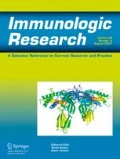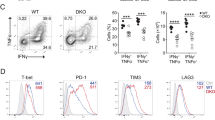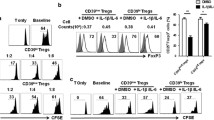Abstract
Induced regulatory T cells (iTregs) are essential to maintain immunological tolerance, immune homeostasis and prevention of autoimmunity. Some studies suggest that glycogen synthase kinase 3β (GSK3β) is involved in the mouse iTreg differentiation; however, whether GSK3β inhibits or enhances iTreg differentiation is still a matter of controversy. To address this issue, we have utilized human naïve CD4+ T cells and investigated whether GSK3 activity changes during iTreg differentiation and whether altering GSK3 activity influences the development of iTregs and its suppressive function. As a constitutively activated kinase, during iTreg differentiation GSK3β became quickly deactivated (phosphorylated at serine 9), which is dependent on MAPK pathway rather than PI3-kinase/Akt pathway. Our results indicated that inhibition of GSK3β by specific inhibitors, SB216763 or TDZD-8, promoted the differentiation of iTreg and increased their suppressive activity. In contrast, overexpression of GSK3β significantly inhibited iTreg differentiation. Furthermore, GSK3β inhibition enhanced iTreg differentiation through the TGF-β/Smad3 pathway. Taken together, this study demonstrates that inhibition of GSK3β enhances human iTreg differentiation and its suppressive activity, and provides a rationale to target GSK3β as a novel immunotherapeutic strategy.





Similar content being viewed by others
References
Josefowicz SZ, Lu LF, Rudensky AY. Regulatory T cells: mechanisms of differentiation and function. Annu Rev Immunol. 2012;30:531–64.
Sakaguchi S, Miyara M, Costantino CM, et al. FOXP3+ regulatory T cells in the human immune system. Nat Rev Immunol. 2010;10(7):490–500.
Hilbrands R, Howie D, Cobbold S, et al. Regulatory T cells and transplantation tolerance. Immunotherapy. 2013;5(7):717–31.
Bluestone JA, Abbas AK. Natural versus adaptive regulatory T cells. Nat Rev Immunol. 2003;3(3):253–7.
Issa F, Hester J, Goto R, et al. Ex vivo-expanded human regulatory T cells prevent the rejection of skin allografts in a humanized mouse model. Transplantation. 2010;90(12):1321–7.
Nadig SN, Wieckiewicz J, Wu DC, et al. In vivo prevention of transplant arteriosclerosis by ex vivo-expanded human regulatory T cells. Nat Med. 2010;16(7):809–13.
Kong N, Lan Q, Chen M, et al. Antigen-specific transforming growth factor beta-induced Treg cells, but not natural Treg cells, ameliorate autoimmune arthritis in mice by shifting the Th17/Treg cell balance from Th17 predominance to Treg cell predominance. Arthritis Rheum. 2012;64(8):2548–58.
Huang H, Ma Y, Dawicki W, et al. Comparison of induced versus natural regulatory T cells of the same TCR specificity for induction of tolerance to an environmental antigen. J Immunol. 2013;191(3):1136–43.
Karlsson F, Martinez NE, Gray L, et al. Therapeutic evaluation of ex vivo-generated versus natural regulatory T-cells in a mouse model of chronic gut inflammation. Inflamm Bowel Dis. 2013;19(11):2282–94.
Beurel E, Michalek SM, Jope RS. Innate and adaptive immune responses regulated by glycogen synthase kinase-3 (GSK3). Trends Immunol. 2010;31(1):24–31.
Ding Y, Shen S, Lino AC, et al. Beta-catenin stabilization extends regulatory T cell survival and induces anergy in nonregulatory T cells. Nat Med. 2008;14(2):162–9.
Graham JA, Fray M, de Haseth S, et al. Suppressive regulatory T cell activity is potentiated by glycogen synthase kinase 3{beta} inhibition. J Biol Chem. 2010;285(43):32852–9.
Beurel E, Yeh WI, Michalek SM, et al. Glycogen synthase kinase-3 is an early determinant in the differentiation of pathogenic Th17 cells. J Immunol. 2011;186(3):1391–8.
Beurel E, Kaidanovich-Beilin O, Yeh WI, et al. Regulation of Th1 cells and experimental autoimmune encephalomyelitis by glycogen synthase kinase-3. J Immunol. 2013;190(10):5000–11.
Fu R, Li J, Zhong H, et al. Broncho-Vaxom attenuates allergic airway inflammation by restoring GSK3beta-related T regulatory cell insufficiency. PLoS One. 2014;9(3):e92912.
Xia Y, Rao J, Yao A, et al. Lithium exacerbates hepatic ischemia/reperfusion injury by inhibiting GSK-3beta/NF-kappaB-mediated protective signaling in mice. Eur J Pharmacol. 2012;697(1–3):117–25.
Li MJ, Rossi JJ. Lentiviral vector delivery of recombinant small interfering RNA expression cassettes. Methods Enzymol. 2005;392:218–26.
Fang J, Hodivala-Dilke K, Johnson BD, et al. Therapeutic expression of the platelet-specific integrin, alphaIIbbeta3, in a murine model for Glanzmann thrombasthenia. Blood. 2005;106(8):2671–9.
Kang Y, Chen CR, Massague J. A self-enabling TGFbeta response coupled to stress signaling: Smad engages stress response factor ATF3 for Id1 repression in epithelial cells. Mol Cell. 2003;11(4):915–26.
Gulen MF, Bulek K, Xiao H, et al. Inactivation of the enzyme GSK3alpha by the kinase IKKi promotes AKT-mTOR signaling pathway that mediates interleukin-1-induced Th17 cell maintenance. Immunity. 2012;37(5):800–12.
Beurel E, Jope RS. The paradoxical pro- and anti-apoptotic actions of GSK3 in the intrinsic and extrinsic apoptosis signaling pathways. Prog Neurobiol. 2006;79(4):173–89.
Hoeflich KP, Luo J, Rubie EA, et al. Requirement for glycogen synthase kinase-3beta in cell survival and NF-kappaB activation. Nature. 2000;406(6791):86–90.
Varela AT, Simoes AM, Teodoro JS, et al. Indirubin-3’-oxime prevents hepatic I/R damage by inhibiting GSK-3beta and mitochondrial permeability transition. Mitochondrion. 2010;10(5):456–63.
Ren F, Duan Z, Cheng Q, et al. Inhibition of glycogen synthase kinase 3 beta ameliorates liver ischemia reperfusion injury by way of an interleukin-10-mediated immune regulatory mechanism. Hepatology. 2011;54(2):687–96.
Laurence A, Amarnath S, Mariotti J, et al. STAT3 transcription factor promotes instability of nTreg cells and limits generation of iTreg cells during acute murine graft-versus-host disease. Immunity. 2012;37(2):209–22.
Betts BC, Veerapathran A, Pidala J, et al. STAT5 polarization promotes iTregs and suppresses human T-cell alloresponses while preserving CTL capacity. J Leukoc Biol. 2014;95(2):205–13.
Pearl LH, Barford D. Regulation of protein kinases in insulin, growth factor and Wnt signalling. Curr Opin Struct Biol. 2002;12(6):761–7.
Haxhinasto S, Mathis D, Benoist C. The AKT-mTOR axis regulates de novo differentiation of CD4+ Foxp3+ cells. J Exp Med. 2008;205(3):565–74.
Sauer S, Bruno L, Hertweck A, et al. T cell receptor signaling controls Foxp3 expression via PI3K, Akt, and mTOR. Proc Natl Acad Sci USA. 2008;105(22):7797–802.
Lu L, Wang J, Zhang F, et al. Role of SMAD and non-SMAD signals in the development of Th17 and regulatory T cells. J Immunol. 2010;184(8):4295–306.
Tran DQ, Ramsey H, Shevach EM. Induction of FOXP3 expression in naive human CD4+ FOXP3 T cells by T-cell receptor stimulation is transforming growth factor-beta dependent but does not confer a regulatory phenotype. Blood. 2007;110(8):2983–90.
Meiler F, Zumkehr J, Klunker S, et al. In vivo switch to IL-10-secreting T regulatory cells in high dose allergen exposure. J Exp Med. 2008;205(12):2887–98.
von Boehmer H. Mechanisms of suppression by suppressor T cells. Nat Immunol. 2005;6(4):338–44.
Collison LW, Workman CJ, Kuo TT, et al. The inhibitory cytokine IL-35 contributes to regulatory T-cell function. Nature. 2007;450(7169):566–9.
Tone Y, Furuuchi K, Kojima Y, et al. Smad3 and NFAT cooperate to induce Foxp3 expression through its enhancer. Nat Immunol. 2008;9(2):194–202.
Xiao S, Jin H, Korn T, et al. Retinoic acid increases Foxp3+ regulatory T cells and inhibits development of Th17 cells by enhancing TGF-beta-driven Smad3 signaling and inhibiting IL-6 and IL-23 receptor expression. J Immunol. 2008;181(4):2277–84.
Guo X, Ramirez A, Waddell DS, et al. Axin and GSK3- control Smad3 protein stability and modulate TGF-signaling. Genes Dev. 2008;22(1):106–20.
Zhao YG, Wang Y, Guo Z, et al. Dihydroartemisinin ameliorates inflammatory disease by its reciprocal effects on Th and regulatory T cell function via modulating the mammalian target of rapamycin pathway. J Immunol. 2012;189(9):4417–25.
Acknowledgments
We thank Prof. Li M (Zhongshan School of Medicine, China) for providing the human GSK3β plasmid. This work was supported by grants from the National Natural Science Foundation of China (No. 81373165 and No. 81273261) and Six Talents Peak in Jiangsu Province of China (2013-WSW-022).
Conflict of interest
The authors declare no financial or commercial conflict of interest.
Author information
Authors and Affiliations
Corresponding authors
Electronic supplementary material
Below is the link to the electronic supplementary material.

12026_2015_8635_MOESM1_ESM.jpg
Supplementary material 1 (JPEG 270 kb): Human CD4+ T cells were cultured in medium supplemented with SB216763 or TDZD-8 for 1 hour. Phospho-glycogen synthase(p-GS), GS, GSK3β, and GAPDH protein levels were analyzed by immunoblotting

12026_2015_8635_MOESM2_ESM.jpg
Supplementary material 2 (JPEG 104 kb): Human CD4+ T cells were cultured in medium supplemented with SIS3 in the presence or absence of SB216763 for 1 hour. P-Smad3, Smad3 and GAPDH protein levels were analyzed by immunoblotting
Rights and permissions
About this article
Cite this article
Xia, Y., Zhuo, H., Lu, Y. et al. Glycogen synthase kinase 3β inhibition promotes human iTreg differentiation and suppressive function. Immunol Res 62, 60–70 (2015). https://doi.org/10.1007/s12026-015-8635-3
Published:
Issue Date:
DOI: https://doi.org/10.1007/s12026-015-8635-3




